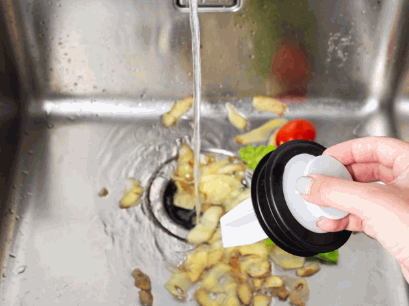Dealing with a slow-draining sink or foul odors from the drain? It’s time to clean your sink drain.
We discuss the importance of cleaning the sink drain, the tools needed, and step-by-step instructions.
We also cover how often to clean your drain, signs it needs cleaning, and tips for preventing clogs.
Keep reading to maintain your sink’s condition!
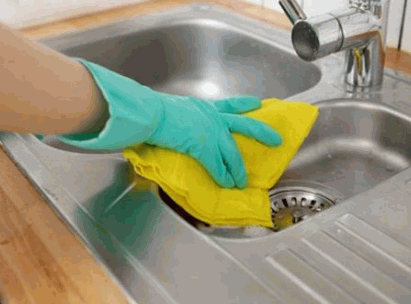
Why Is It Important To Clean The Drain Of A Sink?
Maintaining a clean sink drain is crucial for the overall hygiene and functionality of your bathroom.
Regular cleaning of the sink drain is essential to prevent clogs and maintain proper drainage. Accumulated debris can lead to foul odors, attracting bacteria and pests, which can be detrimental to the overall cleanliness of your bathroom. A clean sink drain not only enhances the aesthetic appeal of your bathroom but also contributes to a more pleasant ambiance. Neglecting this simple task can result in costly plumbing issues down the line, causing inconveniences and potential water damage.
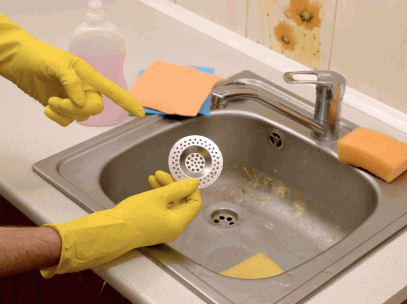
What Are The Tools Needed To Clean The Drain Of A Sink?
To effectively clean a sink drain, you will require tools such as vinegar, baking soda, a plunger, a drain snake, and rubber gloves.
Regarding maintaining the cleanliness and functionality of your sink, these essential tools play a vital role.
- Vinegar and baking soda are a dynamic duo known for their natural cleaning properties. While vinegar helps dissolve buildup and deodorize, baking soda acts as a scouring agent to eliminate grime.
- On the other hand, a plunger is perfect for dislodging stubborn clogs by creating pressure to push through blockages. A drain snake is an invaluable tool for reaching deep into the pipes, and clearing out debris that may be causing slow drainage.
- Finally, rubber gloves protect your hands from harsh chemicals and bacteria, ensuring a safe and hygienic cleaning experience. By utilizing these tools effectively, you can maintain a clean and odor-free sink drain effortlessly.
Discover more: Can You Use Drain Unblocker On A Toilet
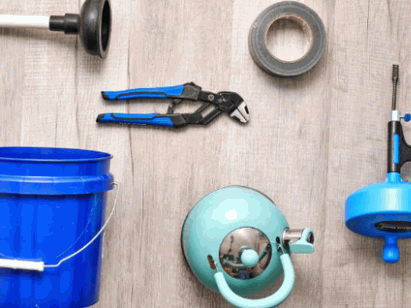
How To Clean The Drain Of A Sink?
Cleaning the drain of a sink can be done using various methods such as employing vinegar and baking soda, utilizing a drain snake, or seeking assistance from a professional plumber.
One common method to tackle a clogged sink drain is by creating a homemade solution with vinegar and baking soda. Start by pouring a cup of baking soda down the drain followed by a cup of vinegar. Let the mixture fizz for about 30 minutes before flushing it with hot water. This natural combination can help break down blockages and eliminate odors.
Remove Any Visible Debris
Start by removing any visible debris such as hair or other materials that may be causing the sink drain to clog.
To effectively clear out the sink drain, you can begin by unscrewing the drain cover if it’s removable. Once you have access to the drain, utilize a pair of gloves to pull out any visible blockages like hair or soap scum. Use a flashlight to inspect the drain further, ensuring all debris is removed.
It’s crucial to regularly clean the sink drain to prevent clogs and maintain a smooth drainage system. By actively clearing out these common culprits, you can minimize the chances of experiencing slow drainage or backup issues, thus keeping your sink functioning at its best.
Use A Plunger
Utilize a plunger to create pressure and dislodge any grease or debris obstructing the sink drain. Ensure to dispose of any extracted material properly.
When using a plunger, ensure a proper seal is formed around the drain opening to maximize pressure. Push down and pull up the plunger vigorously to create suction and pressure alternately. This action helps to break up and dislodge the clog effectively. Once the water starts draining smoothly, remove the plunger and run hot water to flush out any remaining debris or grease that may cause future blockages.
After unclogging the drain, it is crucial to properly dispose of the extracted material. Do not flush it down the same drain as it could lead to further issues. Instead, collect the debris in a disposable bag or container and throw it in the trash to prevent the reoccurrence of the blockage.
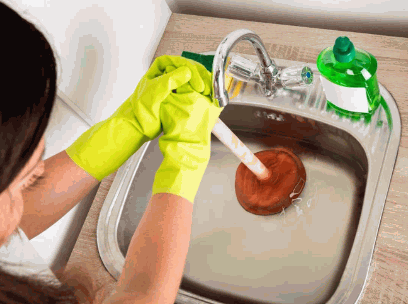
Try A Natural Cleaning Solution
Consider using a natural cleaning solution composed of vinegar, baking soda, and lemon to effectively unclog and deodorize your sink drain.
These common household ingredients are not only eco-friendly but also highly effective in removing debris and freshening up your plumbing system. When mixed in the right proportions, the fizzing reaction of baking soda and vinegar can break down organic matter, while the acidity of lemon juice helps cut through grease and eliminate unpleasant smells.
To create this DIY drain cleaner, pour a cup of baking soda down the drain followed by a cup of vinegar. Let the mixture sit for a few minutes before flushing it with hot water. For an added fresh scent, squeeze some lemon juice down the drain and let it sit for a while before rinsing.
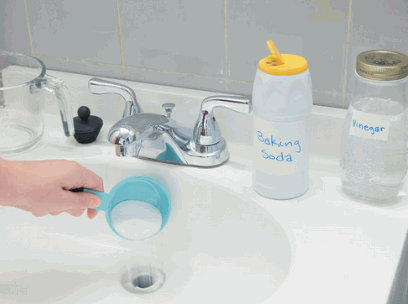
Use A Drain Snake
For stubborn clogs, employing a drain snake can effectively navigate through the pipes and remove blockages without resorting to harsh chemicals.
When faced with a particularly stubborn clog in your sink, a drain snake comes in handy as a reliable tool. The flexible, slender design of a drain snake allows it to navigate through the twists and turns of your pipes, reaching deep into the plumbing system to dislodge blockages. Unlike harsh chemicals that can potentially damage your pipes, a drain snake offers a more gentle yet effective solution. By inserting the drain snake into the drain opening and rotating it clockwise, you can hook onto and pull out the debris causing the blockage, restoring your sink’s functionality.
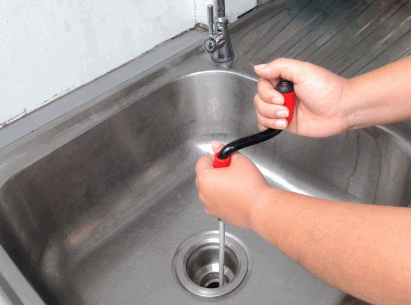
Call A Professional Plumber
When all else fails or if you prefer a hands-off approach, contacting a professional plumber in San Angelo can provide a comprehensive solution for cleaning your sink drain.
Professional plumbers in San Angelo have the expertise to tackle even the most stubborn clogs that DIY methods may not effectively resolve. They use advanced methods such as hydro-jetting, snaking, and camera inspection to accurately diagnose and address the root cause of the issue.
These professionals possess the necessary tools and knowledge to ensure that your sink drain is not just cleaned but also properly maintained to prevent future problems, saving you time, money, and unnecessary stress.
How Often Should You Clean The Drain Of A Sink?
To maintain optimal sink drainage and prevent clogs, it is recommended to clean the drain of your kitchen sink regularly using white vinegar and boiling water.
Regular maintenance of your kitchen sink drain is crucial to avoid unpleasant blockages and ensure smooth functionality. Over time, debris, grease, and food particles can build up in the drain, leading to slow drainage and potential clogs. By incorporating a simple routine of cleaning with a mixture of white vinegar and boiling water, you can effectively break down and eliminate any accumulation within the pipes.
What Are The Signs That Your Sink Drain Needs To Be Cleaned?
Identifying foul odors emanating from the drain, water backing up in the basin, or noticing the need for a scouring agent are common signs that your sink drain requires cleaning.
Slow water drainage could be another indication that your sink drain needs attention. When water takes longer to clear out of the sink, it may point to a partial blockage accumulating in the pipes. If you start seeing residue or grime building up around the drain, it’s advisable to take action before it worsens into a more severe clog.
Slow Draining Water
One of the primary indicators that your sink drain requires cleaning is the presence of slow-draining water, suggesting a potential blockage in the pipes.
Slow drainage in a sink may seem like just a minor inconvenience at first, but it can actually be a warning sign of bigger issues lurking beneath the surface. When water takes longer to go down the drain, it often indicates that there is a buildup of debris or clogs obstructing the flow in the pipes.
If left unattended, these clogs can worsen over time, leading to more serious blockages that may require professional intervention to resolve. Ignoring the slow drainage can result in potential leaks, water damage, or even complete pipe blockages, causing further inconvenience and costly repairs.
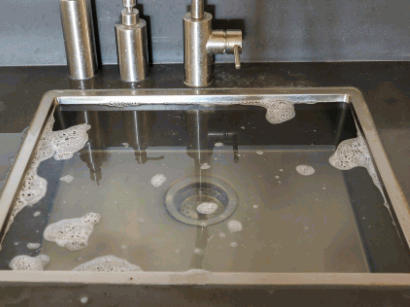
Foul Odors Coming From The Drain
Unpleasant odors emanating from the drain are a clear indication that thorough cleaning with vinegar or other cleaning agents is required to eliminate bacterial buildup and debris.
Foul smells coming from sink drains often result from a combination of food particles, grease, and other residue that can accumulate over time, providing an ideal breeding ground for bacteria. The presence of these bacteria and decaying matter leads to the release of unpleasant odors, which can be quite off-putting.
By regularly using vinegar as a natural cleaning agent, you can dissolve stubborn grime, kill germs, and neutralize odors effectively. This simple method helps to not only tackle existing odors but also prevent them from returning, maintaining a fresh-smelling drain.
Water Backing Up In The Sink
Observing water backing up in the sink when in use is a clear indicator of a clogged drainage system in need of immediate attention, especially in the bathroom sink.
When water starts to slow down and accumulate instead of swiftly draining away, it’s a sign that something is blocking the flow. Ignoring this warning can pave the way for a messy situation, leading to the potential for water overflow and damage to your bathroom.
Addressing the clog promptly should be a top priority to avoid costly repairs and inconvenience. Simple preventive measures like using a hair catcher or regularly flushing with hot water can help keep your sink clear of blockages and functioning smoothly.
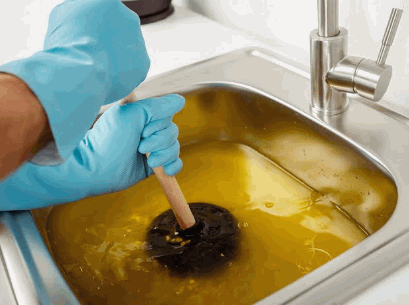
How To Prevent Clogs In The Sink Drain?
Preventing sink drain clogs can be achieved by using methods such as regular salt treatments, avoiding harsh drain cleaners, and proper disposal of waste in the disposal.
Regular salt treatments are effective in preventing grease buildup in the pipes, as salt helps to break down fat and oil deposits, keeping the drains flowing smoothly.
Avoiding harsh drain cleaners is essential as they can corrode the pipes over time, leading to more serious plumbing issues and potentially harmful chemical exposure.
Proper disposal of waste in the disposal means not putting items like coffee grounds, grease, or large food scraps down the drain, which can accumulate and cause blockages.
Use A Sink Strainer
Installing a sink strainer in the kitchen sink helps trap debris and prevents it from entering the drain, reducing the risk of clogs.
A sink strainer serves as a simple yet effective solution to safeguard your plumbing system. Capturing food scraps, coffee grounds, and other unwanted particles before they make their way down the drain, it significantly decreases the chances of blockages that can lead to costly repairs.
The primary benefit is the prevention of plumbing issues caused by debris buildup. Not only does a sink strainer enhance the longevity of your pipes, but it also promotes a cleaner and more hygienic kitchen environment by eliminating foul odors that often accompany trapped residue.
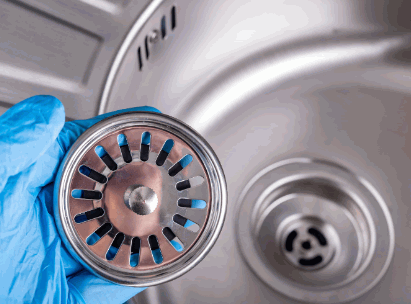
Avoid Pouring Grease Down The Drain
To prevent clogs in the kitchen sink drain, it is essential to avoid pouring grease or fats down the drain, as they can solidify and obstruct the pipes.
When grease is poured down the drain, it may seem harmless initially as it flows down smoothly. As it cools, it congeals and sticks to the walls of the pipes, gradually building up and eventually causing blockages.
This buildup not only restricts water flow but can also lead to foul odors emanating from the sink.
Over time, untreated grease blockages can result in costly plumbing repairs or even the need to replace sections of the piping system.
Regularly Clean The Sink
Regularly cleaning the sink and ensuring non-food items do not go down the drain are essential steps in maintaining the cleanliness and proper function of your sink drain.
By cleaning your sink regularly, you can prevent the buildup of soap scum, grease, and food particles that can lead to stubborn clogs.
It’s important to remember that even small non-food items like hair, jewelry, or small toys can cause blockages in your drain over time.
To avoid the hassle of dealing with a clogged sink, incorporate simple maintenance routines into your cleaning schedule.
Ensuring a clear pathway for water flow in your sink will not only optimize drainage but also extend the lifespan of your plumbing system.
Avoid Putting Non-Food Items Down The Drain
Prevent sink drain clogs by refraining from disposing of non-food items such as rubber gloves or other objects that can obstruct the basin and lead to blockages.
Improper disposal practices can not only result in annoying clogs but also may pose serious risks to your plumbing system. When non-food items such as rubber gloves are put down the sink drain, they can accumulate, creating a blockage that could lead to overflowing sinks or even damage to your pipes. Harsh chemicals or certain materials in these items can cause corrosion, further compromising your plumbing. To avoid these issues, it’s essential to follow safe waste management practices.
- including never discarding non-food items down the drain.
- Regularly clean your sink strainer to catch any accidental debris before it reaches the pipes, and if a clog does occur, use safe methods such as a plunger or a drain snake to clear it.
By being mindful of what goes down your sink drain, you can maintain a smoothly running plumbing system for years to come.
